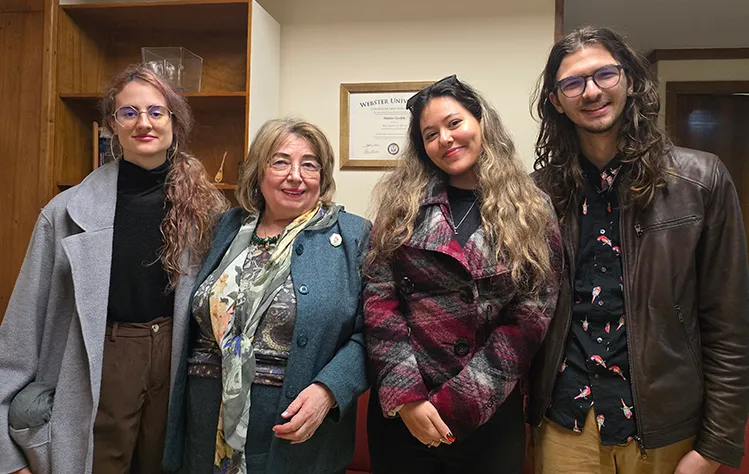Contact the Admissions Office
Call +30 211 999 5309 (office) or email athensadmissions@webster.edu
or Admissions Director, Margarita Lazarou, at margaritalazarou@webster.edu
Programs approved by the Ministry of Education, Research and Religious Affairs of the Hellenic Republic.
Call +30 211 999 5309 (office) or email athensadmissions@webster.edu
or Admissions Director, Margarita Lazarou, at margaritalazarou@webster.edu


MBA Program Director
[Music begins and continues through the entire video.]
Text on screen: WEBSTER UNIVERSITY PROGRAM SPOTLIGHT: Master of Business Administration (MBA)
Text on screen: Steve Hinson, MBA Program Director
[Footage of Steve Hinson being interviewed.]
Steve Hinson: The whole curriculum is about value creation, even beginning from the very first course, which is titled Value Creation.
Text on screen: VALUE CREATION
Every course needs to point toward the same goal.
[Lengthy montage of photos with various students learning.]
The marketing class you take, that's all about creating value for customers. In finance, we're talking about how we create value for shareholders, how we measure value. In the capstone, we're looking at how we measure value more broadly, how is it affecting workers, the environment, and of course, how is it affecting the bottom line?
[Another montage, but with unique stock photos intertwined with pieces of Hinson’s interview.]
For a classic MBA program, what you — what you typically find, the courses were very siloed. The finance class really has nothing to do with your marketing class or your work behavior class. And then it's really up to the student after they finish the MBA program to try to integrate this knowledge and figure out how all these pieces fit together.
Having this thematic approach to the program makes the program a lot more coherent.
Text on screen: One global MBA program, MULTIPLE MODALITIES
[Images depicting logging into Webster’s Connections or scrolling Webster’s website on various platforms such as on a laptop or a smart phone.]
We've actually developed all of the course content upfront, so every student is interacting with that online content, and Webster University, no matter what the modality.
[A third montage of students studying in different locations mixed with more sections of Hinson’s interview shot.]
We offer the MBA program in three modalities now. We offer the traditional on ground.
Text on screen: 1. In Person
We offer classes by Zoom, what we call WebNet+. And then we offer fully online classes, which are completely asynchronous classes.
Text on screen: 3. Fully Online
[Another montage of students learning, studying or talking and professors teaching with Hinson’s interview in between shots.]
Regardless of the modality you choose at Webster University, everyone shares the same course content. We've got this really robust platform. We designed it very carefully with the instructional designers. It's very accessible. Go online, you learn it, engage with it, and then come to class, let’s talk about it.
Text on screen: A diverse network of PRACTITIONER FACULTY
Really, what class is about, is the three Cs. We are coming for clarification, for context and for collaboration.
Text on screen: clarification, context, collaboration
Our faculty add context, helping students understand the applicability of the knowledge. The instructor is a subject matter expert. We'll make it make sense, but hopefully we can get passed that pretty quickly because the real value to you is that we provide the context:
How does this apply to my job? How does this apply to what I'm reading? How does this apply to companies I know and experiences as both consumer or as an employee? Really understand how this applies in the real world, so that how it applies for you.
Text on screen: An innovative approach to BUSINESS EDUCATION
[The photos and interview shot montage continues.]
What a business does is it takes existing resources and combines them to create something of greater value. We’re creating value for our customers, creating value for owners and we're creating value for all the other relevant stakeholders.
And everything always points toward that singular purpose. If you're interested in getting an MBA, you're trying to figure out how can I gain a lot of experience and a lot of knowledge very quickly so that I can speed up my career trajectory.
All the courses are really focused on how does business and the activities of business all coordinate with each other synergistically to create value for all of these relevant stakeholders so that no matter where you are in the organization, we want you to be able to see: Okay, how do I fit in? Why do I exist? What it is that I'm trying to accomplish? What are we trying to accomplish together?
[Music swells as the montage ends. The background changes to blue with several photos of Webster University buildings, and a layer of the ACBSP logo on top.]
Text on screen: Proudly accredited by ACBSP, Global Business Accreditation
Text on screen: LEARN MORE AT WEBSTER.EDU
[Outro]
The Webster University MBA is accredited by the by the Accreditation Council for Business Schools and Programs (ACBSP). The ACBSP accredits quality business programs across the globe at over 1,000 institutions. ACBSP is dedicated to improving the quality of business schools and programs around the world, and ultimately to improving the practice of business in every industry around the world.



MBA, ’22
Our MBA program regularly places on regional and national lists, and is accredited by the Accreditation Council for Business Schools and Programs.
Our Master of Business Administration was carefully crafted to ensure you develop essential competencies for today’s workforce. Enhance your resume with skills in 18 business and nine personal effectiveness areas that make you an attractive candidate.
Personalize your path to an MBA at Webster with in-person classes or a hybrid, "flipped classroom" option for hands-on learning. You may also choose a completely online MBA degree — with live stream or recorded instruction — for true convenience.
Take advantage of Webster’s relationships with corporate partners, as well as professional networking events to make connections that will benefit your career with a Master of Business Administration.
What is an MBA degree without real-life education in a global economy? At Webster, we offer a unique international experience that includes a one-week trip another country, such as Austria, China or Greece. Extend your studies at one of our campus locations around the world and build an international network.
For each emphasis for Webster’s MBA degree, we offer additional subject area expertise. We also offer dual degree options that pair an MBA with other master’s degrees, such as Health Administration, Environmental Management, Finance or Science Management and Leadership, among other choices.
This purpose is made clear in the following program learning outcomes:
To achieve these outcomes, the Webster MBA focuses on the role each business process plays in creating value and the Business Competencies necessary for students to achieve organizational objectives. The curriculum complements these with Personal Effectiveness Competencies necessary for students to accomplish their personal and professional goals. Both sets of competencies are practiced throughout the curriculum in an innovative delivery method that combines online learning with weekly, two-hour application and discussion sessions, either face-to-face or online.
The MBA curriculum is organized into three parts: Value Creation Foundation, Value Creation Components and Value Creation in Practice. The Value Creation Foundation must be completed before progression to the Value Creation Components which, in turn, must be completed before taking the two Value Creation in Practice classes.
*Students with a previous ACBSP (or equivalent) accredited degree or students who pass a waiver exam may substitute an elective for BUSN 5000.
Requirements for an area of emphasis in the MBA program include the MBA required coursework (33 credit hours) and additional course requirements as identified below for each individual area of emphasis. If BUSN 5000 has been waived, the required hours are reduced by 3 credits and the BUSN 5000 course does not require a substitution.
Cybersecurity for students interested in the art and science of cybersecurity management.
The MBA with an emphasis in cybersecurity must include the following courses:
Digital marketing management is for students who have a background in marketing and an interest in obtaining specific expertise in the growing field of digital marketing.
The MBA with an emphasis in digital marketing management must include the following courses:
Health administration is for students interested in the health care industry.
The MBA with an emphasis in health administration must include the following courses:
*HLTH 5050 and HLTH 5100 may substitute for MBA 5020.
Project management is designed to equip the students with theoretical concepts and the practical skills needed for successfully completing projects on time and within budget.
The MBA with an emphasis in project management must include the following courses:
Founded in 1915, Webster is an independent nonprofit university with students studying at campus locations in North America, Europe and Asia, and in a robust online learning environment. With its main campus in St. Louis, Missouri, USA, Webster University’s network of faculty, staff, students and alumni forge powerful bonds with each other and their communities around the globe. The University is committed to engaged learning experiences and empowering our students to become catalysts for change. In 2014, Webster Athens joined our network to bring the best of American education with the only fully owned and controlled (academically and financially) accredited campus of a U.S. university in Greece.

December 22, 2025
December 2, 2025
Experts, diplomats and graduate students formed a dynamic conference on Security, Migration and Human Rights in the...

October 30, 2025